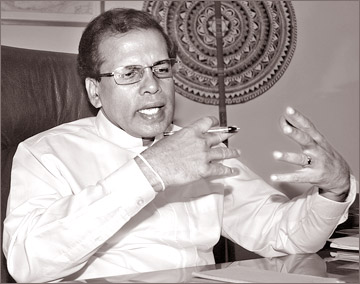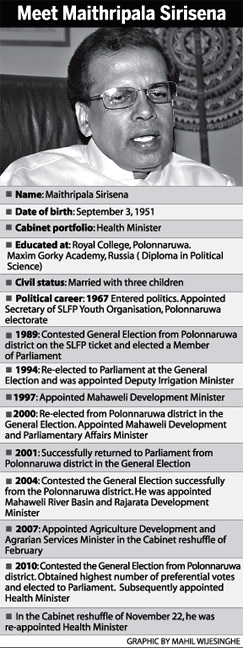No constructive Opposition today - Minister Maithripala Sirisena
By Uditha KUMARASINGHE
 SLFP General Secretary and Health Minister Maithripala Sirisena said
the Opposition should properly organise themselves as a constructive
Opposition rather than just make baseless allegations against the
Government. SLFP General Secretary and Health Minister Maithripala Sirisena said
the Opposition should properly organise themselves as a constructive
Opposition rather than just make baseless allegations against the
Government.
The Minister in an interview with the Sunday Observer said the role
of the Opposition is to point out mistakes of the Government and make
constructive criticism.
The overwhelming majority obtained by the Government at the Second
Reading of Budget 2011 also showed the failure of the Opposition even to
properly organise their Members for a vote.
Q:Do you see Budget 2011 as a budget which has given relief to
the people?
A:When a budget is presented, there is a traditional attitude
among the people that it would provide instant or short term relief. We
should change that mentality. Annual budget proposals presented by a
Government are directly connected with the annual development plan of
that Government. Therefore most of the budget proposals are aimed at
long term results.
As a short term relief, a pay hike has been given to public servants.
The argument on the percentage of that pay hike has to be analysed based
on the economic situation in the country. If the position of our
Treasury is very satisfactory salaries of public servants can be
increased by a large amount. Some people question why a large amount of
money has been allocated to defence as the war against terrorism has
been ended. We have to understand this situation. It will take another
10 or 15 years to pay debts on military equipment purchased to conduct
the war. Therefore the annual budget has to allocate a large amount of
money as defence expenditure within the next 10 or 15 years as well.
Budget 2011 has laid a solid foundation and presented a series of
proposals to strengthen the economy.
Q:The Opposition alleges the budget has failed to increase the
salaries of public servants or reduce the cost of living burden. Your
comments?
A:This is the traditional role of the Opposition. We can't
expect anything else from them. When we were in the Opposition, we also
did the same thing. Therefore they always oppose whether it is a good or
bad move. We should not seriously consider what the Opposition says as
there is no constructive Opposition today.
 The Opposition should organise themselves as a constructive
Opposition rather than just talk or make baseless allegations against
the Government. It should point out the mistakes of the Government and
make constructive criticism. In order to do that, their prime
responsibility is to form a better Opposition. The Opposition should organise themselves as a constructive
Opposition rather than just talk or make baseless allegations against
the Government. It should point out the mistakes of the Government and
make constructive criticism. In order to do that, their prime
responsibility is to form a better Opposition.
Q:Do you think Budget 2011 has presented a broad economic
vision on the targets to be achieved by the Government within the next
five years?
A:Definitely. These budget proposals have been presented in
accordance with the Government's ten year plan. Of this ten year plan,
we have already completed five years. Therefore allocations and plans
have been made by targeting the next five years.
Q:Do you think the Government would be able to reach the
expected economic goals and turn Sri Lanka into the "Wonder of Asia"
during the second term of the President?
A:This is not a target which can be achieved by the President
alone. Everybody should join hands to turn this target into a reality.
When a country finally wins the war against terrorism, the post conflict
scenario is the ideal time to rebuild that country.
Political stability has been created in Sri Lanka while the
Government has been able to gain a two third majority in Parliament. We
have also a President who has been elected with an overwhelming majority
and a country which is free of terrorism.
If politicians, public servants and all other sections of society act
as one it won't be difficult for us to realise this target.
Q:Why did the Government decide to create new Senior Minister
portfolios? The Opposition alleges senior politicians have been
undermined
A:The Senior Ministers possess a longstanding political
experience. The UNP cannot argue on the number of our Cabinet. How many
Ministers were in the Governments of Presidents J.R. Jayewardene and
Ranasinghe Premadasa? During his two and a half years regime, as Prime
Minister Ranil Wickremesinghe changed his Cabinet three times.
That is the history of the UNP. They have no right to point their
finger at us. Of the total number of 225 members in Parliament, the
Government has 165. We have appointed Cabinet Ministers to suit the
composition of 165 members and the people's representation in the
country.
The President has vested responsibilities in Senior Ministers as
well. They have been asked to work in collaboration with the Ministers
and provide necessary guidance to their plans by utilising their
knowledge and experience.
Q:The Second Reading of Budget 2011 was passed in Parliament
with an overwhelming majority. How do you view this?
A:All Opposition members did not come even to vote at the
Second Reading of the budget. The Government obtained 150 votes while
the Opposition had only 46 at the voting and TNA abstained from voting.
This clearly indicates the stable position maintained by the Government
in Parliament. The Opposition has failed even to properly organise their
members for a vote.
Q:Has the budget allocated sufficient funds to develop the
health sector?
A:According to annual budgetary estimates, nearly Rs. 75,000
million is allocated to the Health Ministry. In addition separate
allocations have been made under several sections.
The Rs. 1,100 million allocated to provide Thriposha to children has
been increased to Rs. 1,500 million. A separate Rs.900 million
allocation has been made to treat non-infectious diseases such as heart,
diabetes, kidney and diseases caused by smoking. All together, Rs.
90,000 million has been allocated to the Health Ministry so that it
would help fulfil a series of work in the health sector during 2011.
Q:Is there a shortage of drugs in Government hospitals?
A:There is no drug shortage. But there are shortcomings on the
process of drug management. Sufficient drug stocks are available in our
stores. If there is a drug shortage in a particular hospital, that is
mainly due to the fault of their distribution. If there is a shortage of
drugs in a hospital, they should contact Director Supplies of the Health
Ministry to get those drugs.
Q:What kind of plan has been formulated to develop the health
sector?
A:Our main objective is to implement the National Drug Policy
next year. The victories in the health sector can only be achieved after
the implementation of this drug policy. Due to drug rackets the prices
of drugs have gone up while people have not been able to purchase
quality drugs.
I intend to implement this drug policy step by step. It cannot be
implemented within 24 hours. Basic arrangements are being made to
implement it. Steps have also been taken to develop the facilities in
hospitals and increase hospital staff.
Initiatives have also been taken to overcome the shortcomings in the
process of the management of drug distribution. At present there is no
human resource division in the Health Ministry which has nearly 80,000
employees. Steps will be taken to appoint a Human Resource Director to
the Health Ministry.
Measures will also be taken to upgrade the primary health services in
rural areas. If more resources are provided to rural and regional
hospitals, it would help minimise the number of patients that come to
major hospitals in cities. |

